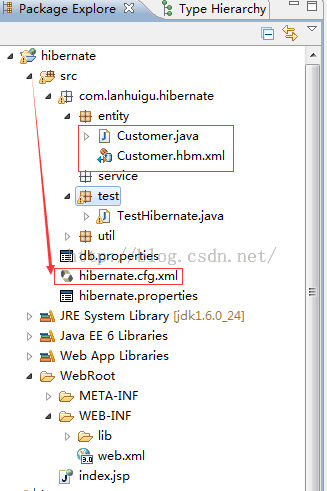hibernate开发环境搭建
1.导入hibernate基本jar包,hibernate-3.2\lib或hibernate-release-4.2.2.Final\lib\required。
2.创建web项目
我的目录结构。
注意:
1.实体类与关系映射文件在同一目录下
Customer.java
Customer.hbm.xml
2.hibernate.cfg.xml在src目录下
3.实体对象和对象关系映射文件配置(Customer.hbm.xml配置)
-------------- 实体对象
package com.lanhuigu.hibernate.entity;
import java.io.Serializable;
import java.sql.Date;
import java.sql.Timestamp;
public class Customer implements Serializable{
private static final long serialVersionUID = -2934493050228154410L;
private Long id;
private String name;
private String email;
private String password;
private int phone;
private boolean married;
private String address;
private char sex;
private String description;
private byte[] image;
private Date birthday;
private Timestamp registeredTime;
public Customer(){}
public Long getId() {
return id;
}
public void setId(Long id) {
this.id = id;
}
public String getName() {
return name;
}
public void setName(String name) {
this.name = name;
}
public String getEmail() {
return email;
}
public void setEmail(String email) {
this.email = email;
}
public String getPassword() {
return password;
}
public void setPassword(String password) {
this.password = password;
}
public int getPhone() {
return phone;
}
public void setPhone(int phone) {
this.phone = phone;
}
public boolean isMarried() {
return married;
}
public void setMarried(boolean married) {
this.married = married;
}
public String getAddress() {
return address;
}
public void setAddress(String address) {
this.address = address;
}
public char getSex() {
return sex;
}
public void setSex(char sex) {
this.sex = sex;
}
public String getDescription() {
return description;
}
public void setDescription(String description) {
this.description = description;
}
public byte[] getImage() {
return image;
}
public void setImage(byte[] image) {
this.image = image;
}
public Date getBirthday() {
return birthday;
}
public void setBirthday(Date birthday) {
this.birthday = birthday;
}
public Timestamp getRegisteredTime() {
return registeredTime;
}
public void setRegisteredTime(Timestamp registeredTime) {
this.registeredTime = registeredTime;
}
}
--------------对象关系映射文件
<?xml version="1.0"?> <!DOCTYPE hibernate-mapping PUBLIC "-//Hibernate/Hibernate Mapping DTD 3.0//EN" "http://hibernate.sourceforge.net/hibernate-mapping-3.0.dtd"> <!-- 1.hibernate-mapping对象关系映射的根元素,其它元素必须嵌套在此元素内 --> <hibernate-mapping package="com.lanhuigu.hibernate.entity"><!-- 2.package为实体类在哪个包下 --> <!-- 3.class中name为持久化的实体类(Customer),table为映射到数据库中的表名(CUSTOMERS), 如果没有设置table,默认类名作为表名 --> <class name="Customer" table="CUSTOMERS"> <!-- 4.以下配置属性解释: 4.1 name为实体类属性 4.2 column为映射到数据库中的字段名,如果没有配置column,默认使用name属性作为映射后数据库表字段名 4.3 type为字段类型,如果没有设置type,映射时自动采用实体类的java类型,对应映射数据库字段类型 java类型映射到数据库类型参照表: java类型>>>>>>>>>>数据库类型 string VARCHAR int INT character CHAR boolean BIT text TEXT binary BLOB date DATE timestamp TIMESTAMP 4.4 not-null设置该字段是否允许为null, 4.5 length设置字段的长度 --> <!-- 设置主键 --> <id name="id" column="ID" type="long"> <!-- 主键生成方式--> <generator class="increment"/> </id> <!-- 基本属性,基本属性必须设置在主键之口--> <property name="name" column="NAME" type="string" length="25" not-null="true" /> <property name="email" column="EMAIL" type="string" not-null="true" /> <property name="password" column="PASSWORD" type="string" not-null="true" /> <property name="phone" column="PHONE" type="int" /> <property name="address" column="ADDRESS" type="string" /> <property name="sex" column="SEX" type="character" /> <property name="married" column="IS_MARRIED" type="boolean" /> <property name="description" column="DESCRIPTION" type="text" /> <property name="image" column="IMAGE" type="binary" /> <property name="birthday" column="BIRTHDAY" type="date" /> <property name="registeredTime" column="REGISTERED_TIME" type="timestamp" /> </class> </hibernate-mapping>
4.hibernate.cfg.xml配置
<!DOCTYPE hibernate-configuration PUBLIC "-//Hibernate/Hibernate Configuration DTD 3.0//EN" "http://hibernate.sourceforge.net/hibernate-configuration-3.0.dtd"> <!-- hibernate-configuration为hibernate配置头文件 --> <hibernate-configuration> <!-- 配置session-factory, SessionFactory是Hibernate的工厂类, 该类负责Hibernate的配置和Hiberante的Session接口中save(),update(),delete(),load(),find()的操作 --> <session-factory> <!-- 1.数据库连接配置 --> <!-- 数据库连接url --> <property name="connection.url">jdbc:mysql://192.168.200.12:3306/hbtest</property> <!-- 数据库连接用户名 --> <property name="connection.username">root</property> <!-- 数据库连接口令 --> <property name="connection.password">root123</property> <!-- 数据库连接驱动 --> <property name="connection.driver_class">com.mysql.jdbc.Driver</property> <!-- 数据库方言 --> <property name="dialect">org.hibernate.dialect.MySQLDialect</property> <!-- 数据库连接池大小配置 --> <property name="connection.pool_size">1</property> <!-- 配置使用二级缓存的类 --> <property name="cache.provider_class">org.hibernate.cache.internal.NoCacheProvider</property> <!-- 一次读的数据库记录数 --> <property name="jdbc.fetch_size">50</property> <!-- 设定对数据库进行批量删除条数 --> <property name="jdbc.batch_size">30</property> <!-- 2.是否打印sql配置 --> <property name="show_sql">true</property> <!-- 3.对象-映射关系文件的位置 --> <mapping resource="com/lanhuigu/hibernate/entity/Customer.hbm.xml" /> </session-factory> </hibernate-configuration>
5.测试配置
package com.lanhuigu.hibernate.test;
import org.hibernate.SessionFactory;
import org.hibernate.cfg.Configuration;
import org.hibernate.tool.hbm2ddl.SchemaExport;
/**
* 基本简单测试配置是否成功
*/
public class TestHibernate {
public static void main(String[] args) {
//SessionFactory sessionFactory;
Configuration configuration = new Configuration().configure();
//sessionFactory = configuration.buildSessionFactory();
SchemaExport export = new SchemaExport(configuration);
export.create(true, true);
}
}
6.结果
1.控制台输出
drop table if exists CUSTOMERS
create table CUSTOMERS (
ID bigint not null,
NAME varchar(25) not null,
EMAIL varchar(255) not null,
PASSWORD varchar(255) not null,
PHONE integer,
ADDRESS varchar(255),
SEX char(1),
IS_MARRIED boolean,
DESCRIPTION longtext,
IMAGE tinyblob,
BIRTHDAY date,
REGISTERED_TIME datetime,
primary key (ID)
)
2.去自己数据库看到一张表:CUSTOMERS
说明配置成功,hibernate开发环境基本搭建完成,可以进行接下来的hibernate操作
